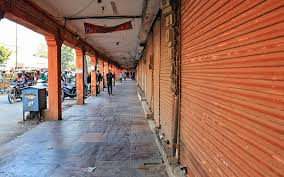Bharat Bandh on 9 July 2025: 6 key questions answered as 25 crore workers go on strike

India is gearing up for one of the largest labor strikes in recent history. On 9 July 2025, nearly 25 crore workers across the country are set to participate in a Bharat Bandh (nationwide shutdown) organized by major trade unions. This massive strike is expected to disrupt several sectors and affect daily life for millions of Indians. In this article, we answer the six most important questions about the Bharat Bandh so you can understand the causes, impact, and what to expect on the day.
1. Why is the Bharat Bandh being called?
The Bharat Bandh is primarily a protest against recent policies introduced by the central government that many labor unions believe threaten workers’ rights and job security. Unions are demanding better wages, enhanced social security benefits, a halt to privatization efforts in key public sectors, and the repeal of certain labor law amendments they consider unfavorable.
Many workers feel that inflation and rising living costs have not been matched by wage increases, leaving millions struggling to make ends meet. Additionally, there is widespread concern about increasing casualization and contract-based jobs that reduce workers’ protections.
The call for Bharat Bandh comes after months of talks between unions and the government reached an impasse, with unions deciding that a nationwide strike is necessary to push for their demands.
2. Who is participating in the strike?
This Bharat Bandh is being spearheaded by a coalition of over 10 major trade unions including the Indian National Trade Union Congress (INTUC), All India Trade Union Congress (AITUC), Centre of Indian Trade Unions (CITU), and others. Together, they represent workers from both organized and unorganized sectors.
The strike will see participation from:
- Public sector employees in railways, electricity, and other utilities
- Factory and industrial workers in manufacturing units
- Transport workers including bus drivers and truckers
- Bank employees and financial sector workers
- Teachers and employees in educational institutions
- Healthcare workers in government hospitals
- Workers in the informal sector, including daily wage laborers and contract workers
With around 25 crore workers expected to join, this is one of the biggest mobilizations of labor in independent India.
3. What sectors will be affected?
The sheer scale of participation means multiple sectors will face disruptions. Key sectors likely to be hit include:
- Transportation: Most public transport services such as buses and trains are expected to run on limited schedules or be completely shut down in many areas. This will affect commuters, especially those relying on railways for daily travel.
- Manufacturing and Industry: Factories may halt production for the day, affecting supply chains and deliveries.
- Banking and Financial Services: Many bank branches and offices will remain closed, impacting cash withdrawals, loan processing, and other services.
- Education: Schools and colleges may close or run with reduced staff availability, especially government institutions.
- Healthcare: Government hospitals might operate with minimum staff, potentially affecting outpatient services and non-emergency procedures.
- Logistics and Ports: Shipping, loading, and unloading operations may slow down, affecting imports and exports.
Overall, the strike’s reach is extensive, covering urban and rural India alike.
4. How will the Bharat Bandh affect daily life?
For the average citizen, the Bharat Bandh will likely mean disruptions in commuting, government services, and daily errands. Here’s what to expect:
- Travel Disruptions: Limited or no public buses and trains in many cities. Private transport may be available but could be expensive due to increased demand. Traffic may be heavier on roads as people switch to private vehicles.
- Closed Offices and Banks: Many government offices and bank branches will be shut, delaying routine work such as document processing, financial transactions, and appointments.
- Limited Healthcare Access: Though emergency services will continue, non-urgent hospital visits might face delays or cancellations.
- Interrupted Supply Chains: Factories and warehouses closing temporarily may impact availability of some goods, especially perishable items.
- Protests and Roadblocks: Some areas may see picketing and protest marches, potentially causing local disruptions and traffic jams.
Citizens are advised to plan their activities ahead of time, avoid non-essential travel on the strike day, and stay updated on local announcements.
5. What is the government’s response?
The government has expressed regret over the strike but emphasized that it remains committed to engaging in dialogue with the unions. Officials have warned that essential services must continue without interruption, and some states have already declared provisions to maintain minimum essential services during the bandh.
Security has been tightened in major cities and transport hubs to avoid any law and order issues. The government is also urging workers to reconsider the strike, highlighting steps it claims to have taken to improve worker welfare.
Despite this, the unions have stood firm on their demands, signaling the bandh will proceed as planned.
6. How long will the strike last?
Currently, the Bharat Bandh is officially scheduled for one day only on 9 July 2025. However, unions have warned that if the government fails to meet their demands through negotiations, further strikes or extended protests could follow.
The next few weeks will be critical for talks between union leaders and government representatives. The outcome will determine whether the strike remains a one-day event or escalates into a prolonged movement.
What Lies Ahead?
The Bharat Bandh on 9 July 2025 highlights the growing frustration among India’s workforce over economic pressures and labor reforms. With millions taking part, the strike is not just a protest but a powerful message demanding fair treatment, job security, and respect for workers’ rights.
For citizens, staying informed and planning ahead can help minimize the inconvenience caused by this nationwide shutdown. For policymakers, it serves as a crucial reminder of the need for inclusive growth that benefits workers alongside economic progress.
Stay tuned to local news and government advisories as the bandh day approaches to know about transport schedules, emergency services, and ongoing developments.






